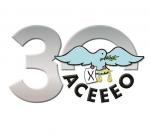
 The ACEEEO in cooperation with the ArabEMBs on 22 April 2021 organized the Second Online Symposium on Youth Participation, in which with the valuable contributions of international experts we continued to discussed the theoretical and practical approaches to the topic.
The ACEEEO in cooperation with the ArabEMBs on 22 April 2021 organized the Second Online Symposium on Youth Participation, in which with the valuable contributions of international experts we continued to discussed the theoretical and practical approaches to the topic.
The Symposium was opened by Zsolt Szolnoki (Secretary General, ACEEEO) and Hisham Kuhail (Executive Board Chairman, ArabEMBs). Mr. Szolnoki highlighted the importance of the cooperation between the European and the Arab regions especially in the topic of youth participation both sides have lessons learnt to share. Mr. Kuhail also emphasized the need of a meaningful cooperation between the two institutions and envisaged further strengthening of professional ties between the
Associations.
The Symposium then proceeded with the first block that tackled the question from both theoretical and practical viewpoint. The first presenter, Jean-Paul Gagnon (Senior Lecturer, Canberra School of Politics, Economics and Society) raised a rather provocative question on why and how the voting age should be lowered. He underlined that it is necessary to change our opinion about youth and possibly involve them into the development of policies. The second presenter was Yuliya Shypilova (Chief Technical Advisor, UNDP Kyrgyzstan), who presented about the Kyrgyz Best Practices on Youth Participation in Elections. Ms. Shypilova undelined that it is important for the youth to take an active part in the electoral processes and, therefore it is necessary to increase their knowledge of voting procedures, and thus contribute to their informed, free and responsible choice.
The second block, moderated by Mais Al-Atiat (Acting Secretary General, ArabEMBs), focused on Youth Participation in the Arab Region. This session included four presentations that summarized the experiences of countries, Mauritania, Tunisia, Libya, and Palestine. His Excellency Mohamed Vall Bilal (President of the Arab Organization for Electoral Administrations and Chairman of the Independent National Elections Commission of Mauritania) started with highlighting the reality of the situation and the fact of youth participation in the Arab region. His Excellency emphasized that Arab EMBs initiated the establishment of the Arab Network for Youth in the elections, to work closely with civil society institutions and political parties to enhance the political and electoral participation of young people various stages of the electoral process. He was followed by Mahmoud Al-Kadiki (Communication and Outreach Coordinator) and Abdulaziz Al-Sharif (Media Unit Officer from the High National Elections Commission of Libya), who were shedding light on the most important reasons for youth abstention from the elections, and talked about the most important programs of the Commission for electoral awareness. In the Tunisian experience, Mona Hatira (Field Coordinator from the Independent High Electoral Commission of Tunisia) clarified the role of the Independent High Electoral Commission in supporting youth participation in elections, starting with the participation of young people within the commission’s strategic plan for the period 2016-2019 within the seventh strategic objective. The ‘Youth Project’ was designated for the benefit of students and youth within the age group 18-25 years. Farid Taamallah (Director of Information and Public Relations at the Central Elections Committee of Palestine) gave a presentation about Youth Participation in the Palestinian Elections. He explained that the Committee prepared a strategy to target youth in the various stages of the electoral process, in line with the requirements of the times and formed youth teams specialized in Social communication platforms with the aim to design attractive content capable of reaching of young people. He also presented several specialized projects that the Committee is implementing with the aim of raising awareness and encouraging participation in the electoral process in cooperation with civil society institutions, from which direct benefits have reached about 200,000 young men and women.
The Symposium was concluded by His Excellency Mohamed Vall Bilal (President of the Arab Organization for Electoral Administrations and Chairman of the Independent National Elections Commission of Mauritania) and János Mécs (Project Manager, ACEEEO), who thanked all the participants and the audience.

